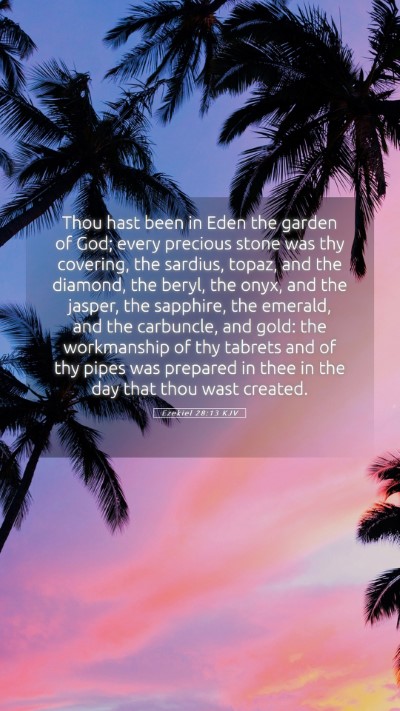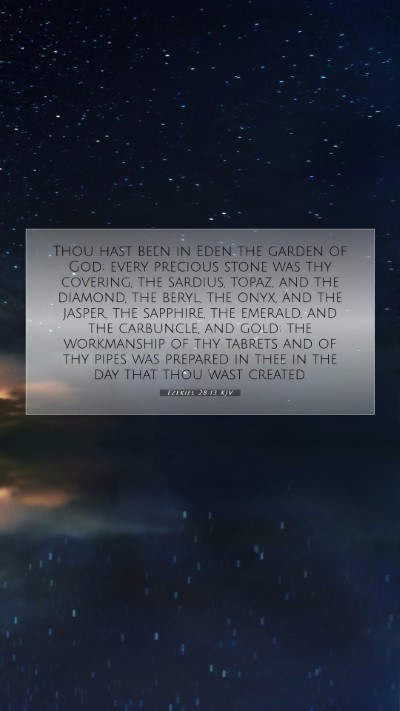Ezekiel 28:13 - Understanding the Verse
Verse: Ezekiel 28:13 (KJV) - "Thou hast been in Eden the garden of God; every precious stone was thy covering, the sardius, topaz, and the diamond, the beryl, the onyx, and the jasper, the sapphire, the emerald, and the carbuncle: and gold: the workmanship of thy tabrets and of thy pipes was prepared in thee in the day that thou wast created."
Summary of the Verse's Meaning
The verse from Ezekiel 28:13 presents a vivid description of the grandeur and beauty associated with a being often interpreted as Lucifer or the King of Tyre. The language used not only highlights the elevated status of this figure but also serves as a metaphor for pride and subsequent fall from grace.
Insights from Public Domain Commentaries
Theological Implications
This verse not only informs readers about the character of the being in question but also serves as a reflection on the nature of pride and its consequences in spiritual leadership. It is crucial in understanding the theological stance on the origins of evil and temptation, connecting to broader Biblical themes of fall and redemption.
Cultural and Historical Context
Ezekiel was prophesying during a time when Judah faced imminent destruction, and his words served to illuminate the judgment not just against nations but also against spiritual entities. Understanding the context of the Jewish exile helps in interpreting this portrayal of a fallen figure, echoing the theme of judgment present throughout the prophetic literature.
Application of Ezekiel 28:13
In contemporary application, believers can derive lessons about humility, the pitfalls of pride, and the need to maintain a heart posture directed towards God rather than self-exaltation. This can be particularly resonant for those participating in Bible study groups or engaging in online Bible study.
Related Bible Cross References
- Isaiah 14:12-15 - Talks about the fall of Lucifer and parallels the pride leading to downfall.
- Genesis 3:24 - Mention of Eden and its significance in the Biblical narrative.
- Revelation 12:7-9 - Discusses the war in heaven and the ultimate defeat of evil.
Conclusion
In summary, Ezekiel 28:13 presents rich insights into the nature of pride and the consequences of turning away from God's intended purpose. As one explores this verse, the commentary of historical theologians enriches the understanding of Scripture, making it a substantive part of Bible study resources. Through diligent Bible verse interpretation, believers gain not just knowledge but also wisdom applicable in daily life.



Matthew Henry's Commentary
Matthew Henry suggests that this verse reflects the glory and splendor that once belonged to the exalted being, who was originally created as a perfect being in God's garden. He emphasizes the rich symbolism of the precious stones that represent beauty and excellence, and how these elements denote not only physical adornment but also the profound wisdom and brilliance that were inherent in this creature.
Albert Barnes' Notes
Albert Barnes points out that the reference to Eden signifies the original state of purity and holiness. He believes this description indicates a time when this being had a divine role, adorned not merely with stones but with divine favor. Barnes further explains that such imagery serves to expose the inherent pride and downfall that came as a result of seeking equality with God.
Adam Clarke's Commentary
Adam Clarke elaborates that the stones listed symbolize various qualities and attributes bestowed on this being. He interprets the mention of musical instruments as indicative of this being's role in leading worship, suggesting that the fall from grace began with a desire to usurp God’s glory. Clarke contextualizes this fight for supremacy within the broader narrative of cosmic rebellion against divine authority.